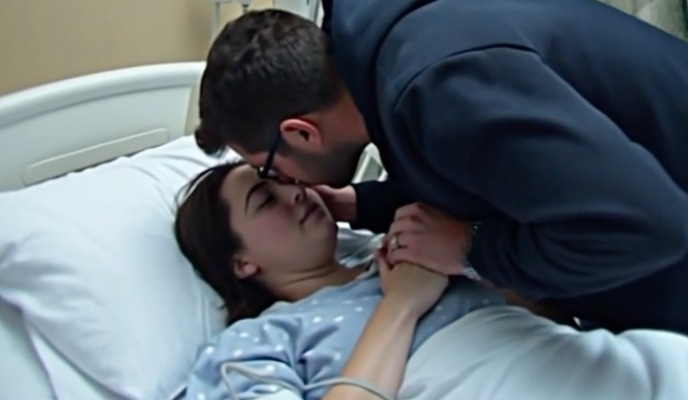The story of a woman who spent months in a coma, her devoted husband by her side, is more than just a tragic moment in a hospital ward. It is a reflection of love, grief, and the profound human struggle of facing loss. When doctors decided that her life support should be removed, the husband’s journey through sorrow revealed the depth of human attachment and the painful choices families face when confronted with life’s most difficult realities.
This narrative does not just belong to one family—it speaks to countless others who have sat by a hospital bed, holding the hand of someone they loved deeply, whispering words of hope even as science and medicine offered none. It is a story of devotion, ethical dilemmas, and the emotional toll of facing the unthinkable.
Life Between Two Worlds
For nearly three months, the woman lay in a quiet hospital ward, caught in the delicate space between life and death. The environment was hushed, broken only by the steady rhythm of machines that kept her body alive. Her husband, refusing to leave her side, became a daily presence at the hospital. To the staff, he embodied loyalty, often arriving with fresh flowers or reading aloud from her favorite books.
Every evening, he would sit close to her bed, gently holding her hand, speaking to her as if she might still hear him. He told her about their life together, recalling trips they had taken, dinners they had shared, and even small conversations about the weather or the news. To anyone watching, his devotion was evident—a picture of love tested by tragedy.
For the nurses and doctors, his presence was a reminder of the human side of medicine. They treated countless patients, but moments like these reminded them that behind every diagnosis and medical chart was a family, a story, and a deep well of emotions.
The Weight of a Medical Decision
Over time, the woman’s condition did not improve. Doctors worked tirelessly, trying treatments, monitoring her vitals, and offering cautious hope. Yet, despite their efforts, her health began to deteriorate. Eventually, the difficult discussion could no longer be delayed.
The medical team explained to the husband that continuing life support would not change the outcome. With compassion, they encouraged him to consider what his wife might have wanted and whether holding on was prolonging her suffering.
Such moments are never easy. Families in similar situations often feel torn between hope and acceptance, love and release. Some hold on for months or years, clinging to the possibility of a miracle. Others, after long reflection, decide to let go, believing it to be an act of love in itself.
The husband, who had prayed daily for her recovery, now faced the most painful decision of his life. His heart resisted what his mind was beginning to understand: that the time had come to say goodbye.
The Final Moments Together
Before the medical team carried out their plan, they gave him privacy. In the dimly lit room, he sat alone with his wife, her stillness a painful contrast to the vibrancy she once carried. The machines continued their mechanical rhythm, but he knew those sounds were nearing their end.
Tears streamed down his face as he spoke softly to her. He told her how much he loved her, how grateful he was for their years together, and how deeply he wished things had been different. His words carried both heartbreak and tenderness, as though he were speaking directly to her soul.
He pressed a gentle kiss to her forehead, whispering a final farewell. It was a scene that reflected the reality many people dread but eventually face: the quiet, intimate goodbye between two people whose lives had been intertwined for decades.
An Unexpected Confession
But in those last moments, something unusual happened. The husband, overwhelmed with emotion, whispered words that carried an unexpected weight. Instead of only speaking of love and loss, he let slip a confession—a deeply personal truth that he had kept hidden.
It was not a declaration he had planned, nor something he expected anyone else to hear. Perhaps the gravity of the moment—the knowledge that this was the last time he would ever be with her—compelled him to unburden himself.
Unbeknownst to him, a nurse making her nightly rounds paused outside the door. She had not intended to intrude, but the raw emotion in his voice caught her attention. As she listened, she heard the words that seemed to shift the meaning of his sorrow.
For the nurse, the moment was chilling, raising questions she could not easily answer. Should she interpret his words literally, or were they the outpouring of a grief-stricken man speaking in metaphors? She quietly withdrew, shaken by what she had heard but unsure what to do with the knowledge.
The Emotional Toll on Caregivers
This moment highlights a truth often overlooked: medical staff, especially nurses, witness not only physical suffering but also the emotional struggles of families. They are present for whispered prayers, quiet breakdowns, and sometimes even confessions like this one.
Such experiences can leave a lasting impression on caregivers. They carry the weight of what they hear, even when they are not certain what it means. Their role is not only to provide medical assistance but also to extend compassion and, at times, to hold the secrets of those they care for.
The Larger Questions of Life and Death
Stories like this one force us to reflect on profound ethical and emotional questions:
- How long should life support continue when recovery seems impossible?
- What role do personal beliefs and family wishes play in such decisions?
- What does devotion look like in the face of inevitable loss?
Medical ethics often wrestle with the balance between extending life and preserving dignity. Families, meanwhile, struggle with the guilt of making such choices. For some, removing life support feels like giving up; for others, it is seen as an act of mercy.
In this case, the husband’s actions reflected the painful complexity of such decisions. His daily devotion showed his love, but his whispered words revealed the burden of emotions he had carried silently for years.
The Aftermath of Goodbye
When the husband finally left the hospital that night, the world outside continued as if nothing had happened. Yet, for him, everything had changed. He was now a man without his lifelong companion, facing a future filled with absence and silence.
The nurse, too, walked away carrying something heavy in her heart. She had witnessed not just the loss of a patient but also the intimate unraveling of a family’s most private moment. The memory would stay with her, shaping the way she approached other patients and families in the future.
A Universal Story of Love and Loss
Though this story is deeply personal, it resonates universally. Around the world, families face similar situations every day—sitting by the bedsides of loved ones, grappling with decisions that feel impossible, whispering final words that may never be heard.
It reminds us that love often endures until the very last breath, and sometimes even beyond. It also shows that in the quiet corners of hospitals, where life and death intersect, moments of truth—both beautiful and painful—emerge.
Conclusion
The story of the woman in a coma, her devoted husband, and the unexpected confession he made in her final moments is not just about one couple. It is about the universal struggle of love, loss, and the human condition.
It calls on us to reflect on our own relationships and to cherish the people we love while we still have time. It also reminds us of the immense challenges faced by medical staff, who carry not only the responsibility of care but also the emotional weight of the stories unfolding around them.
In the end, this is a story of humanity in its rawest form—devotion, heartbreak, and the truths that surface when we stand on the threshold of goodbye.




